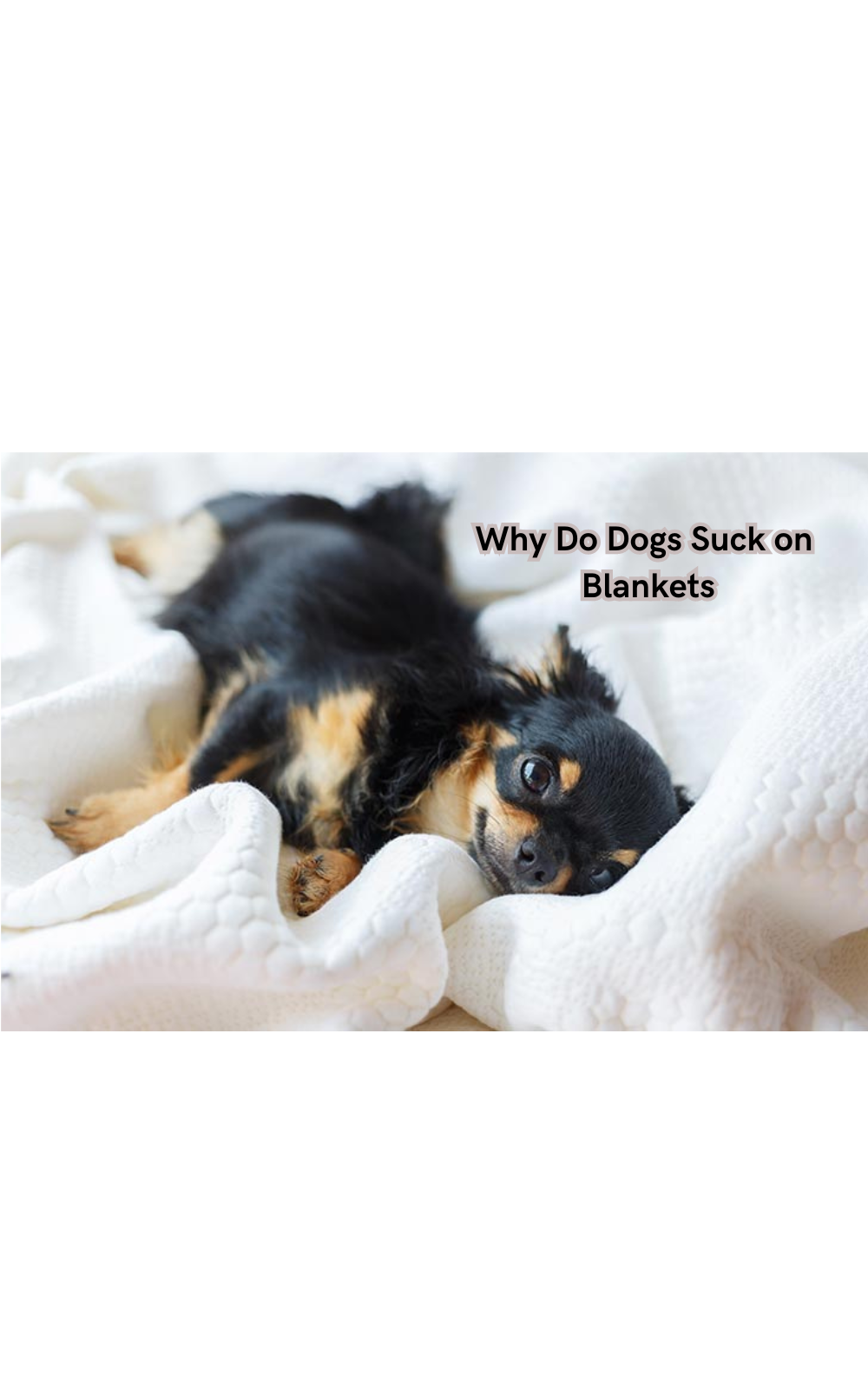Why Do Dogs Suck on Blankets
Understanding why dogs engage in this behavior can provide insights into their well-being, comfort, and overall emotional state. Let's explore the fascinating reasons why dogs exhibit the charming yet enigmatic behavior of sucking on blankets.

The endearing behavior of dogs sucking on blankets, pillows, or other soft objects is a common sight that often raises curiosity among pet owners and enthusiasts. This behavior, known as "sucking" or "wool sucking," can be observed in dogs of various breeds and ages.
While it may appear puzzling or amusing to humans, several reasons behind this canine habit stem from their natural instincts, developmental stages, and emotional needs.
Understanding why dogs engage in this behavior can provide insights into their well-being, comfort, and overall emotional state. Let's explore the fascinating reasons why dogs exhibit the charming yet enigmatic behavior of sucking on blankets.
Overview of Sucking Behavior in Dogs
Sucking has long been observed and studied in various mammals, including dogs. It refers to the repetitive, rhythmic motion of nursing or chewing on objects not intended for ingestion. This behavior is often seen in puppies as they develop their sucking reflex while nursing from their mothers.
This behavior can continue in adult dogs as a soothing mechanism or a way to cope with stress or anxiety. It can also be seen as a sign of boredom, teething, or hunger.
Dogs may suck on various objects, including blankets, pillows, toys, and even their paws. While it may seem harmless, excessive sucking can lead to potential health issues such as gastrointestinal blockages or dental problems.
Why Do Dogs Suck on Blankets?
Let's understand the possible reasons behind this cute yet confusing behavior:
Natural Instincts
Sucking is an instinct in dogs that stems from their early days as nursing puppies. As newborns, puppies rely on the soothing and nourishing sensation of suckling for survival. This reflex is essential for their physical and emotional development.
As they age, this behavior may continue as a comforting mechanism or a way to self-soothe when feeling anxious or stressed. This is why many dogs may suck on blankets or other soft objects when they have left alone, during thunderstorms, or in unfamiliar environments.
Missing Their Mom
Dogs that were weaned off too early or didn't have a strong bond with their mothers may display sucking behavior as a way to fulfill the emotional and nurturing connection they missed out on. In these cases, dogs may suck on blankets as a substitute for their mother's fur, seeking comfort and security.
Boredom or Anxiety
Dogs are highly social animals that thrive on mental and physical stimulation. When left alone for extended periods or not given enough playtime and attention, dogs can become bored, anxious, or even depressed. In these cases, sucking on blankets may provide a sense of entertainment or relief from their emotions.
Teething
Just like human babies, puppies go through a teething phase where they feel discomfort in their gums and seek to chew on things to alleviate the pain. This is a natural and healthy behavior, but it can also lead to excessive sucking on objects such as blankets or toys.
Hunger
Another possible reason for dogs to suck on blankets may be that they are feeling hungry or have not received enough food. Dogs who do not have access to proper nutrition may resort to this behavior as a way to satisfy their hunger.
The Scent Of The Blanket
Dogs have a much stronger sense of smell than humans, and they rely on it to navigate their surroundings. Blankets can carry scents from their owners or other familiar smells that provide dogs comfort and a sense of security.
Canine Compulsive Disorder
In some cases, excessive sucking behavior can be a sign of canine compulsive disorder, a behavioral condition that affects dogs, similar to how OCD affects humans. This is characterized by repetitive actions or movements that serve no purpose and can be seen as a way for dogs to cope with anxiety or boredom.
These are some of the possible reasons why dogs suck on blankets, but every dog is unique and may have their own specific motivations for this behavior. Understanding these reasons can help pet owners identify any potential underlying issues and provide appropriate solutions or seek professional help if needed.
How to Prevent Excessive Sucking Behavior in Dogs
While dogs sucking on blankets may seem innocent and cute, it can potentially lead to health issues or cause damage to household items. Here are some ways pet owners can prevent excessive sucking behavior in their dogs:
- Playtime, walks, and training sessions provide proper mental and physical stimulation.
- Ensuring the dog's nutritional needs are met and providing appropriate chew toys for teething puppies.
- Addressing any underlying emotional issues, such as separation anxiety, by seeking professional help or using calming aids recommended by a veterinarian.
- Providing a comfortable and safe environment with familiar scents to help reduce stress and the need for comforting behaviors.
- Training and redirecting the dog's focus to an appropriate behavior when they start sucking on objects.
These preventive measures can help reduce or eliminate excessive sucking behavior in dogs and promote their overall emotional well-being.
Is Blanket Sucking Harmful?
In most cases, blanket-sucking behavior is harmless and simply a natural or learned behavior for dogs. However, excessive and persistent sucking can lead to potential health issues such as gastrointestinal blockages or dental problems. In these cases, it's essential to keep an eye on the dog's behavior and provide appropriate preventive measures.
Furthermore, if the behavior is causing destruction or distress to the dog or its surroundings, it's best to consult a veterinarian or animal behaviorist for further guidance and support. With proper understanding and care, pet owners can help their dogs manage this behavior healthily and positively.
Is Sucking On A Blanket A Breed Issue?
There is no specific breed that is more prone to sucking on blankets than others. This behavior can be seen in dogs of all breeds, sizes, and ages. However, some breeds may be more predisposed to developing a canine-compulsive disorder or exhibit anxiety-related behaviors that could lead to excessive sucking.
For example, high-energy breeds like Border Collies or German Shepherds may be more prone to boredom and anxiety if not given enough exercise and mental stimulation. On the other hand, breeds like Cavalier King Charles Spaniels or Pomeranians are known for their affectionate and dependent nature, which can lead to separation anxiety and excessive sucking behavior.
FAQs
Why does my dog suck on blankets or stuffed animals?
Dogs often suck on blankets, stuffed animals, and other soft objects as a self-soothing mechanism. This behavior can be traced back to their puppyhood, providing comfort and mimicking the nurturing instinct they experienced through nursing from their mother at a young age. For some dogs, this action persists into adulthood, especially when they find it calming and reassuring.
Can sucking on blankets indicate my dog lacks mental or physical stimulation?
Yes, sometimes when a dog sucks on blankets or stuffed toys, it could be signaling a lack of mental or physical stimulation. Dogs need regular exercise and engaging activities to keep their minds and bodies healthy. Without sufficient stimulation, they might turn to behaviors like sucking on blankets as a coping mechanism to deal with boredom or excess energy. Introducing more interactive playtime and walks can help mitigate this behavior.
Should I be concerned if my dog sucks on blankets as a way to deal with anxiety?
If your dog sucks on blankets or similar items as a way to cope with anxiety, it could be a sign of underlying anxiety issues. While this behavior in itself is not harmful, it's essential to address the root cause of your dog's anxiety. Consistent, comforting routines and possibly working with a professional dog trainer or a veterinarian can provide strategies to help manage your dog's anxiety more effectively.
How can I help my dog if sucking on blankets is becoming excessive?
If you notice that your dog's habit of sucking on blankets or stuffed animals is becoming excessive or compulsive, it might be time to intervene gently. You can start by providing alternative forms of comfort and distraction, such as more playtime together, new toys, or additional exercise. If the behavior persists, consider consulting a professional dog trainer who can offer tailored advice and techniques to help reduce your dog's reliance on this coping mechanism. Addressing any underlying anxiety with the help of a veterinarian can also be beneficial in managing this behavior.
Conclusion
In conclusion, the act of dogs sucking on blankets is a behavior deeply rooted in their instincts, development, and emotional well-being. This behavior can serve various purposes from puppyhood to adulthood, including self-soothing, comfort-seeking, and mimicking maternal care.
While some dogs may engage in sucking as a harmless habit, it's essential for pet owners to monitor this behavior for any potential underlying issues such as anxiety, boredom, or nutritional deficiencies.
By understanding the reasons why dogs suck on blankets, we can better cater to their needs, provide appropriate alternatives, and ensure their overall happiness and contentment.
Embracing this quirky aspect of canine behavior strengthens the bond between dogs and their owners and sheds light on the fascinating world of our beloved furry companions.
